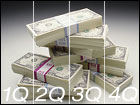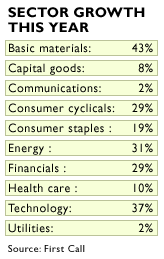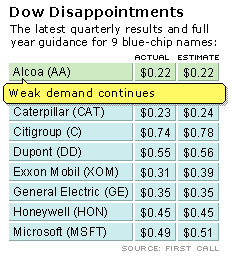
NEW YORK (CNN/Money) -
Corporate profits this spring are expected to post their first quarterly gain in more than a year. So why hasn't the stock market, which hasn't had a winning year since 1999, noticed?
Blame the disconnect on the unreliability of earnings forecasts. Throw in growing doubts about the accuracy of corporate accounting and objectivity of Wall Street research and the relationship between profits and stocks has become as strained as a bad marriage.
Back in October, analysts surveyed by First Call said profits among companies in the Standard & Poor's 500 index might rise 18.4 percent during the June quarter. As of Thursday, the second quarter's projected gain had narrowed to 6.9 percent, falling steadily when companies revealed downbeat details about their outlooks as they reported lukewarm first-quarter numbers. This number could shrink further when the actual reporting season gets under way.
"You have to understand that analysts every year will reduce their forecasts like clockwork," said Joe Kalinowski, equity strategist at Thomson Financial .
When all is said and done, profits this year may rise only about 5 percent, Kalinowski said -- not the current projections calling for a 14.7 percent gain (that number has already been scaled down from the 18.6 percent estimate in October.)

Profits are currently forecast to rise 27.1 percent in the third quarter followed by a whopping 40.3 jump during the last three months of the year. No one on Wall Street expects these numbers to hold up.
"The forecasts have been so off the last couple of years," said Donald Selkin, director of research at Joseph Stevens. "Now, the second quarter projections are being revised lower, so people are pessimistic."
The picture is even more startling when considering earnings estimates by stock sector. Depending on the sector, this year's forecasts reveal some eye-popping gains. Profits among basic materials companies are expected to jump 43 percent, according to First Call, followed by a 37 percent jump for technology companies and 29 percent gains for consumer cyclicals and financials.
But the reputations of the analysts behind these outlooks have dimmed amid investigations into whether they touted stocks to win business for their investment bank employers. Credibility was also hurt by the Enron implosion, which caught many by surprise.
"A lot of investors are taking what they hear with a grain of salt," Thomson's Kalinowski said. "A lot of people just don't trust the numbers that are coming their way."
Joseph Stevens' Selkin links stocks' losses in the face of solid forecasts to shifting profit numbers along with growing questions about how companies report finances.

Seven components among the Dow Jones industrial average missed their first-quarter profits numbers including Microsoft (MSFT: Research, Estimates), Citigroup (C: Research, Estimates), and Dupont (DD: Research, Estimates).
Other problems are surfacing. Analysts divine a company's operating earnings, which exclude unusual gains and losses. But investors have grown less comfortable with these numbers and the companies that report so called pro-forma results or cash earnings. Shares of AOL Time Warner (AOL: Research, Estimates), which posted one of the biggest net losses in corporate history last week, are down 67 percent from their 52-week high. Excluding items, earnings at AOL Time Warner, which owns CNN/Money, topped analysts' forecasts.
Amazon.com (AMZN: Research, Estimates) prefers to exclude debt costs from its numbers. Sales at IBM (IBM: Research, Estimates) have stayed flat for years even as company's profits show steady growth. Tyco (TYC: Research, Estimates) stock has tumbled amid questions about how the company accounts for its accusations that fueled its growth in the 1990s. Then there's Enron's bankrupcty filing and questionable accounting.
"People are so demoralized about all the bad news that tend to make put on a negative spin," said Joseph Stevens' Selkin, who bought shares of Sun Microsystems (SUNW: Research, Estimates) below $8 a share Wednesday.
For his part, Selkin is upbeat, encouraged by low short-term interest rates and economic data signaling the recession has passed.
"I do belive the economy is on the mend and stock prices will follow," said Selkin.

|

